Ditapis dengan

Kajian Kebijakan: Meningkatkan Produktivitas Dan Kapasitas APBDesa Dalam Perc…
UU Desa memberikan kewenangan dan alokasi dana yang besar kepada desa untuk mengelola pembangunannya secara mandiri. Peningkatan signifikan pendapatan desa, dari sekitar Rp 99 triliun pada periode 2010 – 2014 menjadi Rp 454 triliun pada periode 2015-2019. Beberapa capaian nyata antara lain adanya peningkatan sarana dan prasarana dasar baik jumlah maupun volumenya, perbaikan status IDM maupun …
- Edisi
- 1
- ISBN/ISSN
- 978-602-275-222-6
- Deskripsi Fisik
- xiv, 104 Halaman, PDF
- Judul Seri
- Textbook & Ebook
- No. Panggil
- 339.5 TNP k
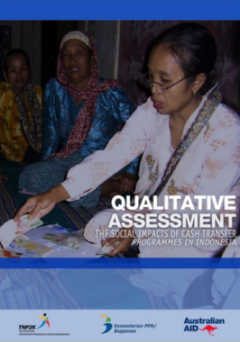
Qualitative Assessment: The Social Impacts Of Cash Transfer Programmes In Ind…
The BLT cash transfer scheme aimed to reach one-third of Indonesian households to provide some compensation for the reduction in the fuel subsidy at a time of rapid fuel and food – particularly rice – price inflation. Cash was disbursed in several rounds in 2005-2006 and again in 2008-2009. BLT attracted considerable negative public attention due to widespread protests, chiefly as a result …
- Edisi
- 1
- ISBN/ISSN
- -
- Deskripsi Fisik
- PDF, 72 Halaman
- Judul Seri
- Textbook dan Ebook
- No. Panggil
- 361.0072 HOS q

Research Report Rapid Appraisal Of The 2011 Data Collection Of Social Protect…
- Edisi
- 1
- ISBN/ISSN
- -
- Deskripsi Fisik
- PDF, 52 Halaman
- Judul Seri
- Textbook dan Ebook
- No. Panggil
- 362.5 TNP r
- Edisi
- 1
- ISBN/ISSN
- -
- Deskripsi Fisik
- PDF, 52 Halaman
- Judul Seri
- Textbook dan Ebook
- No. Panggil
- 362.5 TNP r
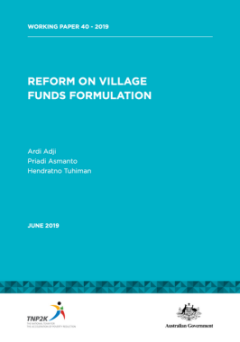
Reform On Village Funds Formulation
The Law No. 6 of 2014 about the Village brought fundamental changes in the management, arrangement and implementation of village governance. In village finances, the law governs the source of village income which can implicates the budget allocation for the village, both sourced from the central budget as well as the regional budget. Since the year 2015, the allocation of village funds increase…
- Edisi
- Working Paper 40 - 2019
- ISBN/ISSN
- -
- Deskripsi Fisik
- PDF, 21 Halaman
- Judul Seri
- Working Paper
- No. Panggil
- 352.14 ADJ r
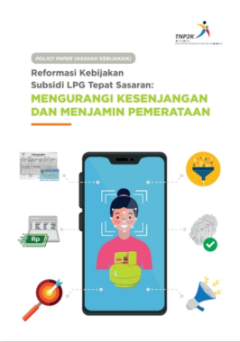
Policy Paper (Naskah Kebijakan) Reformasi Kebijakan Subsidi LPG Tepat Sasaran…
Reformasi kebijakan subsidi energi memiliki relevansi sangat kuat dengan Rencana Pembangunan Jangka Menengah Nasional (RPJMN) 2020-2024, dimana fokus pembangunan diarahkan untuk mewujudkan masyarakat Indonesia yang mandiri, maju, adil, dan makmur melalui percepatan pembangunan di berbagai bidang dengan menekankan terbangunnya struktur perekonomian yang kokoh berlandaskan keunggulan kompetitif d…
- Edisi
- 1
- ISBN/ISSN
- 978-602-275-214-1
- Deskripsi Fisik
- PDF, 92 Halaman
- Judul Seri
- Textbook dan Policy Paper
- No. Panggil
- 361.6 TNP p
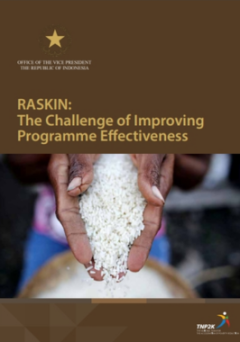
RASKIN: The Challenge Of Improving Programme Effectiveness
The Rice for the Poor programme (Program Subsidi Beras Bagi Masyarakat Berpendapatan Rendah – hereafter the Raskin programme) is a rice sub sidy initiative implemented nationally, across sectors, both horizon tally and vertically. The programme aims to help low-income families meet their basic food needs and thus increase food security throughout Indonesia. The idea behind Raskin is that hous…
- Edisi
- 1
- ISBN/ISSN
- -
- Deskripsi Fisik
- PDF, 76 Halaman
- Judul Seri
- Textbook dan Ebook
- No. Panggil
- 361.6 TNP r
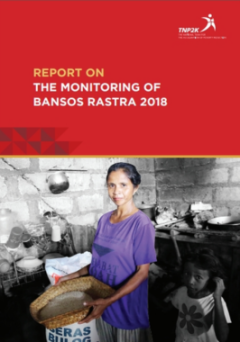
Report On The Monitoring Of Bansos Rastra 2018
To improve the effectiveness and targeting accuracy relating to the implementation of Rastra/Raskin Rice Subsidy Program, the government has stipulated a policy of transforming the Rastra/Raskin Rice Subsidy Program into the Food Social Assistance (Bansos Pangan) Program. In 2017, the Noncash Food Assistance (BPNT) Program was launched in 44 municipalities in replacement of the Rastra/Raskin Su…
- Edisi
- 1
- ISBN/ISSN
- 978-602-275-174-8
- Deskripsi Fisik
- PDF, 54 Halaman
- Judul Seri
- Textbook dan Ebook
- No. Panggil
- 361.2 TNP r
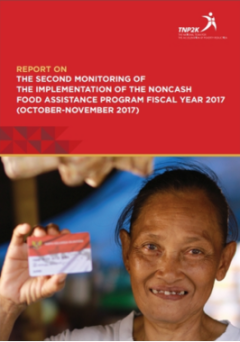
Report On The Second Monitoring Of The Implementation Of The Noncash Food Ass…
The Noncash Food Assistance (BPNT) Program, a transformation of the Welfare Rice Subsidy (Rastra) Program, was launched in the beginning of Fiscal Year 2017 with the target of improving the effectiveness and accuracy of the program as well as promoting inclusive finance. In addition to its transformation from subsidy to social assistance, BPNT also has other reform agenda, including: (1) the tr…
- Edisi
- 1
- ISBN/ISSN
- 978-602-275-188-5
- Deskripsi Fisik
- PDF, 76 Halaman
- Judul Seri
- Textbook dan Ebook
- No. Panggil
- 363.8 TNP r
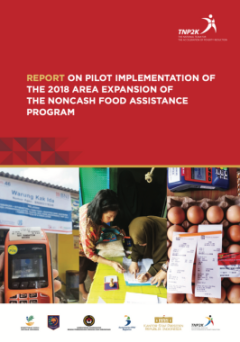
Report on Pilot Implementation of the 2018 Area Expansion of The Noncash Food…
In compliance with the directions from the President, the Noncash Food Assistance Program (Bantuan Pangan Nontunai, BPNT) has been implemented in the context of reforming the Rastra Rice Subsidy Program. The main objective of such food assistance transformation is to ensure that Family Beneficiaries (Keluarga Penerima Manfaat/KPM) would receive the rice in the correct amount, at the right time …
- Edisi
- 1
- ISBN/ISSN
- 978-602-275-190-8
- Deskripsi Fisik
- PDF, 146 Halaman
- Judul Seri
- Textbook dan Ebook
- No. Panggil
- 363.8 TNP r

Results Of A Survey Of Private Hospitals In The Era Of Indonesia’s Jaminan …
Indonesia’s national health insurance scheme (Jaminan Kesehatan Nasional or JKN) is a key element of the Government of Indonesia’s (GOI) commitment to ensuring equitable access to healthcare, especially for the poor and the near-poor. JKN’s contracting with private providers was expected to expand reach faster than simply working through the public sector. The single-payer agency for JKN,…
- Edisi
- 1
- ISBN/ISSN
- 978-1-59560-170-4
- Deskripsi Fisik
- PDF, 46 Halaman
- Judul Seri
- Textbook dan Ebook
- No. Panggil
- 362.1068 ROS r
 Karya Umum
Karya Umum  Filsafat
Filsafat  Agama
Agama  Ilmu-ilmu Sosial
Ilmu-ilmu Sosial  Bahasa
Bahasa  Ilmu-ilmu Murni
Ilmu-ilmu Murni  Ilmu-ilmu Terapan
Ilmu-ilmu Terapan  Kesenian, Hiburan, dan Olahraga
Kesenian, Hiburan, dan Olahraga  Kesusastraan
Kesusastraan  Geografi dan Sejarah
Geografi dan Sejarah